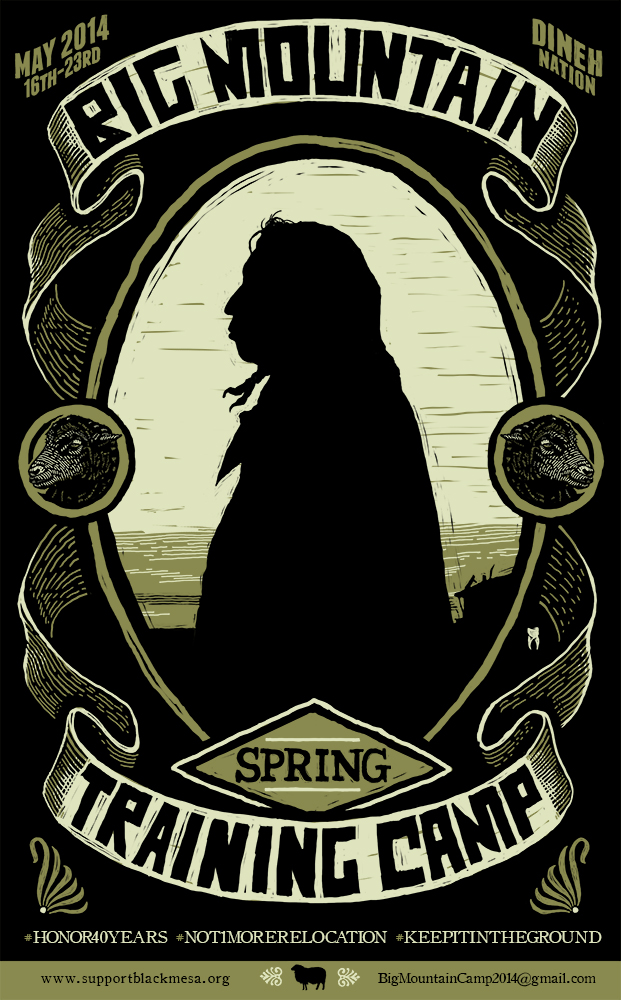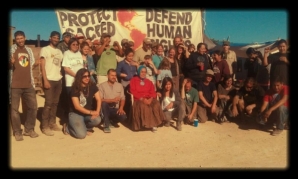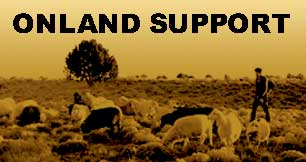Elders Living in Fear and Heartache
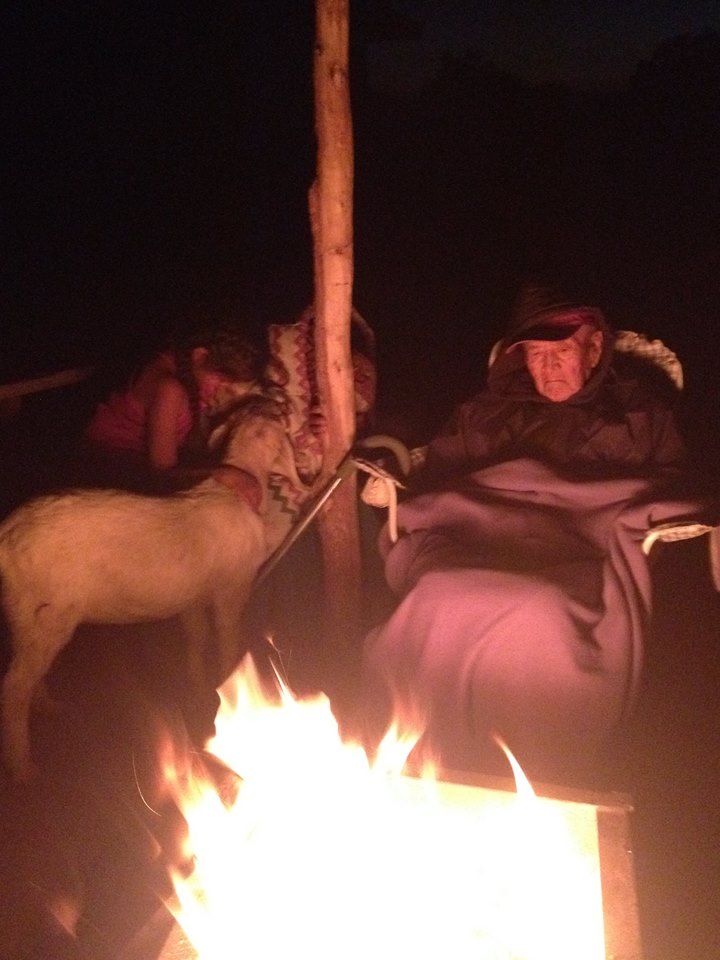
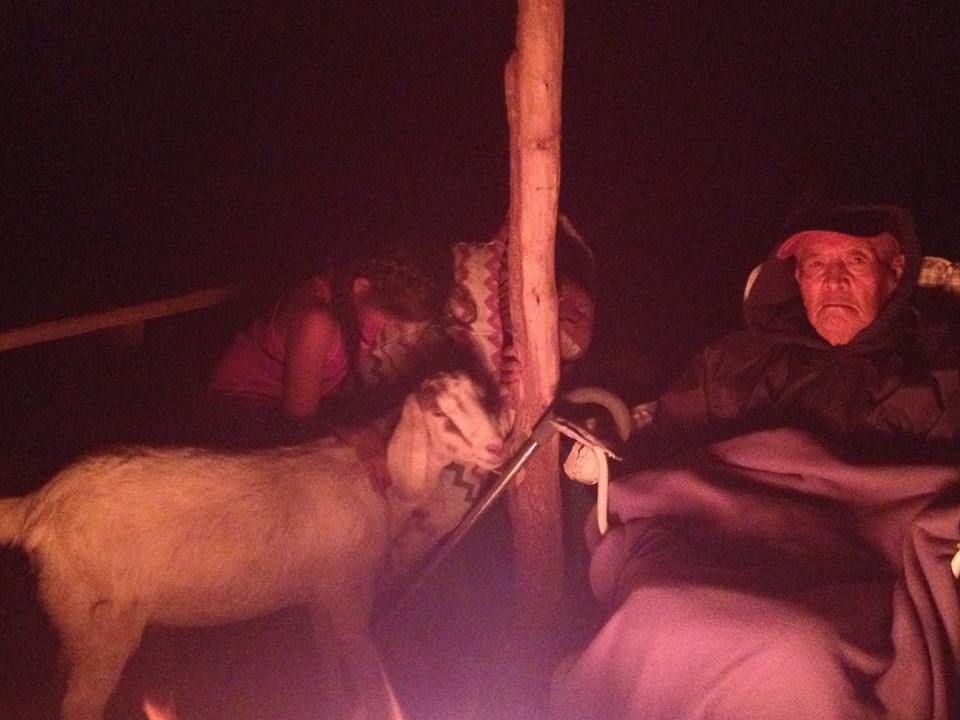 Clarence and Mary Lou Blackrock of Cactus Valley are sitting up all night by the fire, unable to sleep for fear of their sheep being taken. This distress endangers the elder’s health. This family wanted these pictures shared so that the world can see the suffering at the hands of the federal government and Department of the Interior.
Clarence and Mary Lou Blackrock of Cactus Valley are sitting up all night by the fire, unable to sleep for fear of their sheep being taken. This distress endangers the elder’s health. This family wanted these pictures shared so that the world can see the suffering at the hands of the federal government and Department of the Interior.
This is Domestic Terrorism.
UPDATES CONCERNING IMPOUNDMENTS & ARRESTS OF THE SOVEREIGN DINEH NATION ON THE “HPL”
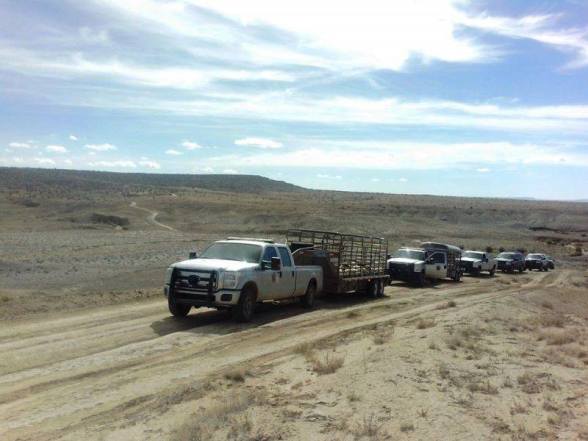
Hopi Rangers arrested two individuals and impounded 120 sheep this morning at the homesite of Tom and Etta Begay in Red Willow Springs. Heavily armed rangers guarded and blocked nearby dirt road entrances as well.
“The Hopi Rangers came for our homestead early this morning. They tried to arrest my Aunt Etta who is almost 70 years old and my dad Bahe. They had barricades set up at the top of the hill with two police units, when we tried to get around the barricade they chased us for two miles, trying to hit us with their trucks, and they drew their guns at us. When we got to the house they brought four more units and tried to block us in by the north hogan. They grabbed us out of our vehicles. A male officer was grabbing me around my waist. I told them they were violating our rights and violating our elders. They were trying to arrest Etta who didn’t even know what they were saying [she doesn’t speak English]. She wasn’t doing anything. They arrested my younger brother Lance and me. Because we were a threat to them for voicing our rights and defending our family. It took three officers to detain me and another three to detain my brother. We didn’t go down without a fight. We were let go after six hours of detainment. I told them they are threatening our family who is all alone and elderly and they come out with guns and threaten and scare them. Who would have defended our family if we didn’t come? We didn’t come with guns and knives; we are not violent, we just came to protect our family. Who knows what they would have done if we weren’t there. We said, we are not scared. We are protecting our elders, if you are going to take us to jail for that, do it. They took 120 sheep from our homestead.”–Milayia Yoe, arrestee.
The U.S government has always used “scorched earth policies” against Indigenous people–attempts to cut them off from their food supplies, decimate economies, or destroy infrastructure–as a precursor to forced relocations including the Long Walk of the Dineh. Livestock impoundments come under this category. There is increased surveillance on the families and livestock of the so-called “HPL” including the use of drones.
“We are in a battleground, the endless battleground of the Partitioned Lands. This is the front of the line and when it comes your family there is no yes or no, you have to stand up for your family and your relatives. This is what I was taught. The past was never really forgotten of the way the U.S. Government treated my people. It is still going on, it is still alive. We will fight- not with violence or armor, but with the old ways. This is a stand for people to know who we are and how we live as Dineh.”–Gerald Blackrock 10/23/14
“The U.S. government is using the Hopi Tribe. We are Native People, we don’t work like this.”–Beulah Blackrock 10/ 28/14
Caroline Tohannie, the elder who had her herd impounded last week, has a court date coming up where she will be facing trespassing charges for being at her homestead.
These impoundments are stressful for the entire community, particularly the elderly:
“Our life is connected to the life of the sheep. We are alive and strong because of them, and being close to them, being with them everyday, keeps us strong. Especially now in our old age the sheep are important to us. If we are too far from our sheep, we can become frail. “ Clarence and Mary Lou Blackrock, Cactus Valley Elders10/25/14
“I disapprove of the impoundments. They really affect the elderly. Ever since I was a baby I was carried on a horse to herd sheep. I have herded all my life and I am in my eighties. You have the livestock in your heart, and they want to take that away.”–Jack Woody, Black Mesa Elder 10/25/14
“They way that the rangers are treating the people goes against the Dineh way; it is very taboo to point a gun at somebody. They are traumatizing an already traumatized community. If overgrazing was actually the issue they could just educate people. But it’s not. This is uncalled for.”–Marie Gladue Big Mountain Resident 10/28/14
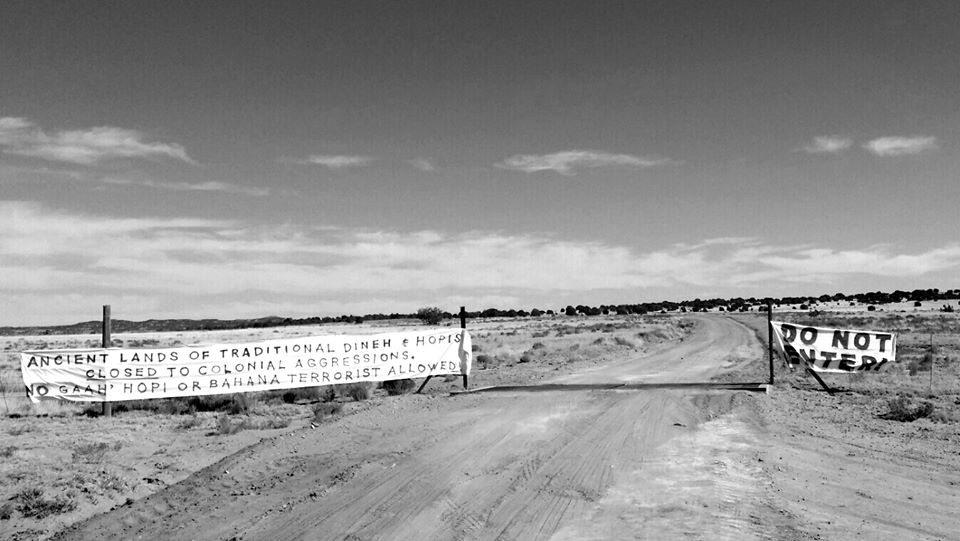
Calls to Action:
*Lawyers needed! If you are a lawyer or have connections to lawyers, residents are requesting legal assistance.
*Call protests at your local Department of Interior or Bureau of Indian Affairs offices, donate funds here, come to the land as a human rights observer (email blackmesais@gmail.com for more information),
*“Call the Bureau of Indian Affairs, the Hopi Rangers, and the Department of Interior. Ask they stop impounding sheep on the HPL. This is current day colonialism, our food sovereignty is being attacked and ask that they stop the unjust impoundments.”–Louise Benally
Call:
-
The BIA superintendent Wendel Honanie at (928-738-2228),
-
Hopi Chairman Herman G. Honanie, Email: hehonanie@hopi.nsn.us, Phone: (928) 734-3102
-
The Hopi Rangers Clayton Honyumptewa at (928-734-3601),
-
The Department of Interior at (602-379-6600)
***Please forward this request far and wide by re-posting or sending this to ten people***
URGENT: WIDESPREAD IMPOUNDMENTS & AN ARREST ON THE HPL OCTOBER 2014
UPDATE from HPL (Hopi Partition Land) residents: Shirley Tohannie and elder Caroline Tohannie had their entire herd of 65 sheep impounded by the Hopi Rangers (US federal government) Tuesday, October 22, 2014.If the fines aren’t paid the sheep will go to auction, and the family is being told that the sheep will not be able to return to the family’s rangeland. The cost to release the livestock is nearly $1,000.
Jerry Babbit Lane, the Tohannie’s neighbor on the HPL, was arrested by Hopi rangers when he attempted to check on his neighbors and was charged with disorderly conduct. He was released this evening, 10/23. Rangers told Shirley they plan to take Rena’s (Jerry’s mother) sheep too and that they’re going to start impounding across the HPL.
As we’re writing, another family on Big Mountain has had nearly their entire herd impounded.
PLEASE DONATE HERE for an impoundment fund.
Residents are requesting human rights observers and sheepherders during this time of escalated harassment. If you or anyone you know can come be a human rights observer to support the Dine resistance on Black Mesa, now is the time. Doing human rights observation work can help stop or slow down the impoundment process. Families who will be potentially impacted by impoundments are requesting solidarity. Email blackmesais@gmail.com if you can come out.
“Call the Bureau of Indian Affairs, the Hopi Rangers, and the Department of Interior. Ask they stop impounding sheep on the HPL. This is current day colonialism, our food sovereignty is being attacked. Call the BIA superintendent Wendel Honanie (at 928-738-2228), the Hopi Rangers Clayton Honyumptewa at (928-734-3601), and the Department of Interior at (202 208-3100) and ask that they stop the unjust impoundments.”–Louise Benally
Although these orders are coming from current Hopi policy, ultimately the relocation laws and livestock impoundments result from the federal government and Peabody Energy’s divide and conquer strategy used to open up the land for massive coal mining. “In the 1970s, Hopi elders encouraged the Dienh elders to remain on their homelands, saying if they did relocate, the coal mine would expand. The Hopi elders said it wasn’t them who wanted the land.”–NaBahii Keediniihii
A July 2012 report by the Navajo Nation Human Rights Commission classifies the relocation as a massive human rights violation and demands the immediate repeal of PL 93-531 and an end to relocation efforts and harassment in the form of surveillance, livestock impoundments, and disruption of gatherings and ceremonies that the resistance community experiences.
The sheep sustain the vitality of the people and the land, and traditional grazing practices need to be supported not severed. Impoundments are nothing less than harassment and human rights violations.
For background information on the resistance of the HPL communities, click here.
***Please forward this request far and wide by re-posting or sending this to ten people***
Request for Sheepherders and Human Rights Observers-July 2014
*******BMIS is in the process of updating our contacts. In order to keep receiving updates from BMIS, please confirm your information here. Thank you!! *****
“This land is being taken away because they’ve got power in Washington. We were put here with our Four Sacred Mountains and we were created to live here. We know the names of the mountains and we know the names of the other sacred places. That is our power. That is how we pray and this prayer has never changed.” ~Katherine Smith, Big Mountain Matriarch
The BMIS collective has been asked to pass on requests for direct on-land support from Dineh (Navajo) families in the following communities on Black Mesa: Thin Rock Mesa, Big Mountain, Wide Ruins, Owl Springs, Teesto, Mosquito Springs, Cactus Valley, Sage Springs, Horse Corral, Star Mountain, Red Willow Springs, Great Springs, and Buckskin Well.
***Please forward this request far and wide by reposting or resending this to ten people***
For four decades these communities have fought to stop the U.S government and Peabody Energy Company’s exploitation of their homelands and communities. Today families remain, steadfastly resisting the mine, colonialism, and forced relocation. Families’ resistance to forced relocation puts them on the front lines of the struggle against resource colonialism in the form of large-scale coal mining.
In the face of colonial laws that undermine sovereign economies and relocation laws that seek to prevent younger generations from living with their parents and grandparents, elders request additional support. You are being invited to the resistance communities’ lands and homes, to assist in daily chores tending livestock and the homesite, and to act as a human rights observer. In this last month, families have gotten letters and visits from government authorities threatening livestock impoundments and herd reductions. As livestock are at the center of traditional life and economy, people are asking for support in maintaining their herds. Your presence as a human rights observer can help deter impoundments. While extended family provides the most consistent and crucial support for their elders, outside supporters are asked to herd sheep so families can more easily go to meetings, medical appointments, organize, weave, visit family…
Come for several weeks, to a month, or longer if you can. Support is appreciated all year round and especially wanted right now in the face of impoundments.
By choosing to offer direct on-land support, you honor not only these elders, but the dedication of their extended families, and the continued legacy of resistance.
Community members are specifically requesting local Dineh youth’s involvement. BMIS will work to prioritize local youth’s participation by providing travel stipends and supplies. Please consider donating to support this work.
Read about the BMIS collective here. BMIS can assist you in the essential process of being self-sufficient on the land. We are happy to speak with you over the phone or email and we offer important online resources like the Cultural Sensitivity & Preparedness Guidebook, as well as a wealth of archives documenting the resistance, all found on our website. We ask volunteers to read the guidebook and register with BMIS to ensure the safety of supporters and as well as families.
*******BMIS is in the process of updating our contacts. In order to keep receiving updates from BMIS, please confirm your information here. Thank you!! ******
Hope to Talk to You Soon,
The BMIS Collective
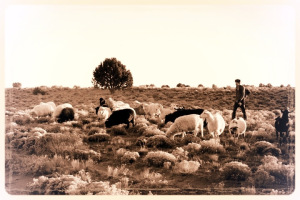
Help get the word out about the Big Mountain Training Camp!
Thanks so much for getting the word out about the Big Mountain Training Camp and helping to honor 40 years of Dineh resistance to cultural genocide, forced relocation, and large-scale coal mining.
This is a important moment for building a broad-coalition of resistance against Peabody. The camp is a collaborative effort of The Elders Circle of the 40-Year Sovereign Dineh Nation Resistance, with Black Mesa Indigenous Support (BMIS), Ho’zho’ogo Nahat’a’, Radical Action for Mountain Peoples Survival (RAMPS), Missourians Organizing for Reform/Revolution & Empowerment (MORE), and Save the Confluence
Facebook event with basic info: https://www.facebook.com/events/237931126402589/
Camp Webpage: https://supportblackmesa.org/2014/03/big-mountain-spring-training-camp/
Donation link: Donate here to ensure that local organizers can participate. Make sure to designate “Big Mountain Training Camp” in your donation: https://supportblackmesa.org/donate/
Coordinating Twitter hashtags: #Honor40Years, #Not1MoreRELOCATION, #KeepitintheGround
Check out the NEW “Honor 40 Years of Resistance” Video:
Like and Share The Memes
Big Mountain Spring Training Camp May 16-23, 2014
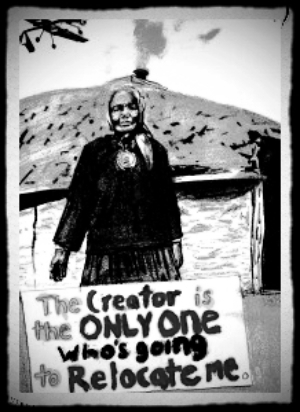
image: frosley fowler
BIG MOUNTAIN SPRING TRAINING CAMP
#Honor40Years
#Not1MoreRELOCATION
#KeepitintheGround
“What we are trying to save—the Female Mountain—is alive. She is alive, she has blood flowing through her veins, which is the Navajo Aquifer, and the coal they are digging is Her liver. They are destroying Her.”–Marie Gladue, Big Mountain Relocation Resister
“We need to exercise our right to be human. To gather on the land and have our words be heard by the ground, the trees, and each other.”–Louise Benally, Big Mountain Relocation Resister
During this moment of peak visibility around climate change, we extend this invitation for a training camp on Big Mountain. We’ll gather to honor 40 years of Indigenous resistance to cultural genocide, forced relocation, and large-scale coal mining.
*Application link at bottom of email* DEADLINE FOR APPLICATIONS IS TUESDAY APRIL 22 at midnight (PST)
The Elders Circle of the 40-Year Sovereign Dineh Nation Resistance, with Black Mesa Indigenous Support (BMIS)–a collective working in solidarity with the Big Mountain and surrounding resistance communities–as well as Radical Action for Mountain Peoples Survival (RAMPS), Missourians Organizing for Reform/Revolution & Empowerment (MORE), and Save the Confluence are collaboratively organizing this camp.
Background on the Training Camp
Building on alliances made during last June’s gathering on decolonization, the collaborative planning process for this gathering has been a combination of conference calls and in-person meetings. Since September, there have been five community meetings on Black Mesa with elders, second generation resisters, and collective members from BMIS. Additionally, monthly meetings are held in Flagstaff with youth and local organizations. Through these meetings, community members have guided the tone, outreach, messaging, goals, and ceremonies necessary for the preparation of this camp. When asked what kind of action elders wanted to see, they shared examples of the different forms of action they have taken while defending their right to remain on their ancestral homeland. They expressed looking forward to sharing their stories as to inspire next generations.
Camp organizers are connecting with trainers and workshop presenters from organizations such as Multicultral Alliance for a Safe Environment (MASE), Save the Confluence, Palestinian Youth Movement, RAMPS, MORE, No One is Illegal (Canada), Puente Human Rights Movement, Sixth World Solutions, Black Mesa Water Coalition, Anti-Uranium Groups, and the Navajo Nation Human Rights Commission. The camp offers a variety of non-violent direct action (NVDA) skills and workshops grounded in legacies of land-based resistance. Spiritual, cultural, artistic practices and healing will be foregrounded.
The workshops and trainings will include:
-
Introduction and History of NVDA
-
The History of the Struggle and Land Dispute on Black Mesa
-
Cultural Work as Resistance to Colonialism
-
Frontline Movement Updates
-
Cultural Sharing and Storytelling
-
NVDA techniques
-
Decolonial visioning
-
Art and prop making
-
People’s Media and Communication (including messaging, social media, and live-streaming)
-
Know Your Rights and legal training
-
…and many more
Exciting workshops and trainings keep getting confirmed for the Big Mountain Spring Training camp.
Narindrankura Nadine (To Nizhoni Ani): “Non-Violent Blockades”
Julius Badonii: “Community Organizing”
Leona Morgan (Diné No Nukes): “Our Nuclear New Mexico”
Janene Yazzie (Sixth World Solutions): “Water Rights and the Future of the Navajo Nation”
@Autumn Chacon: “Pirate Radio”
Andrew Curley (Navajo Times): “Coal Mining and Energy Policy on Navajo Land
@Amanda S. Lickers (Reclaim Turtle Island): “Media and Self-Representation”
“During this gathering, we want to re-create harmony between Indigenous peoples who have been harmed by relocation policies. We want to re-spark the cross-movement connections made at last June’s Gathering by taking action at the site of disruption–the coal mine itself.” — Danny Blackgoat, community organizer and son of Resister Matriarch, Roberta Blackgoat.
Goals:
*To honor 40 years of resistance on Big Mountain and confront resource colonialism
*To build on strategic alliances between anti-extraction struggles in Appalachia and Black Mesa
*To strengthen connections between Indigenous communities on the front lines of land defense
*To build on cross-movement connections made at last June’s gathering for decolonization (on Black Mesa)
*To expand the solidarity network
*To center cultural and spiritual elements of resistance
Logistics:
The training camp is free, including all food, lodging and training. However, we are encouraging participants to fundraise and donate as they are able to help offset costs. BMIS has limited funds for travel stipends and we are prioritizing funding for Indigenous and frontline communities. There will be limited indoor space for sleeping; most participants will be camping. The camp will be in a remote area with no running water, paved roads, or electricity. More details are provided in the application (below).
Call for Sheepherders/ Human Rights Observers:
Resistance community members are requesting returning sheepherders/ human rights observers this spring. Because this camp is held on actively disputed land (see background), it will not be possible without human rights observation during and following the camp. Your involvement will make it possible for the resistance community to participate in the camp and will help mitigate further harassment.
Contact us if you are able to come a week early and help set up base camp!
Click Here to Apply
Contact: BigMountainCamp2014@gmail.com with application questions
In Honor of 40 Years,
The Elders Circle of the Sovereign Dineh Nation, The BMIS Collective, RAMPS, MORE, & Save the Confluence
BMIS Newsletter Fall 2013
|
Big Mountain Resister, Leonard Benally, Passes On
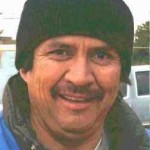
Yesterday, on October 11th, lifelong Big Mountain resident and relocation resister, Leonard Benally, Dineh, passed on to the spirit world. According to his family, he passed on quickly and easily and was surrounded by his family. His family asked that a statement go out to the BMIS support network.
They are remembering him as a strong, free, independent, elder role model who fought until the end. They note how much he influenced them to carry on in the struggle, to fight for what is right, and to not take life for granted. They see him as a warrior who will be watching over them in their continued struggle. They mention that he was a man of few words who taught so much. Now, he is free, they say, in the spirit world among the creators—free of the strife of struggles with tribes, courts, laws, and danger. As much as they and we were not ready for Leonard to pass, the family believes that once he was surrounded by his loved ones—his children, grandchildren, brothers, sisters, nieces, and nephews—he was ready. His family, who are heartbroken but holding strong together, asked for your thoughts, prayers, cards, phone calls of love and support.
Anything will help. You can send emails to blackmesais@gmail.com and we will pass them along, or you can leave voicemails with Leonard’s niece at: 928-206-0311. The family is also requesting donations for the funeral costs and for support during the process of sending Leonard on.
The family repeatedly mentioned that Leonard gained strength from the support network’s work, prayers, phone calls, and relationship. Let’s continue to pass on collectively. They will hold a meeting at Leonard’s Big Mountain residence tomorrow, October 13th, at 3:30pm and would like help serving food, setting up and cleaning. Leonard’s memorial service will be held next Saturday, October 19th, at the Desert Memorial Funeral Home in Tuba City—all are welcome. You can send funeral donations directly to the funeral home, or to BMIS. BMIS will pass the money directly on to the family. If you donate through BMIS, please note that your donation is for the Benally family in a note or memo line.
Some quotes from Leonard on his life of hope and dignity and struggle against Relocation:
“We have been living in silence and we have been dying in silence. We want to share with others our struggle. If we walk alone, we are useless, we are nothing. The old people have told us, take your struggle out to other struggles. Then you can stand together with one freedom. They isolate us, dislocate us and relocate us. Relocation is nothing new to Indigenous people, it has been going on for 500 years.”
“We are victims of terrorism. It takes everything out of us. It breaks us. It tears us down emotionally, psychologically and spiritually. But we have hope out here. Hope lives in the heart. We have a profession, it is the profession of hope.”
“They are trying to erase the history of our people. They tell us we have no history or no tomorrow. But we are still resisting and quite heroically.”
“All we are fighting for is a dignified life. We will never surrender.”
Rest in Power, Leonard

